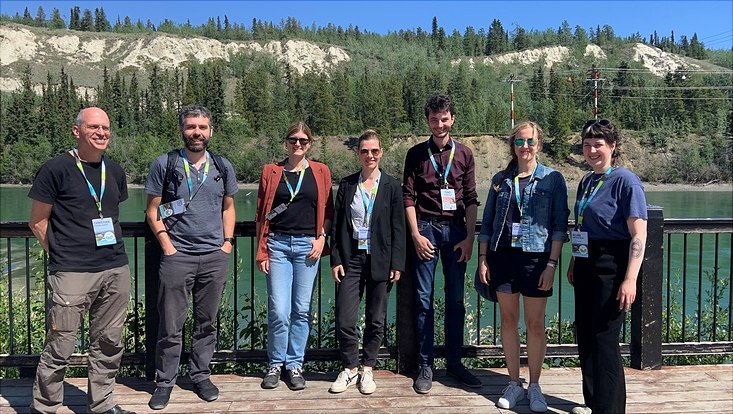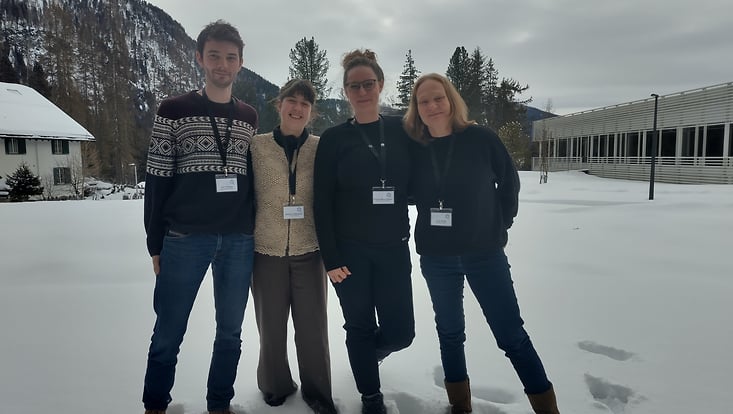MOMENT researchers at the 12th International Conference on Permafrost Research
28 June 2024

Photo: Susanne Liebner
In mid-June 2024, the 12th International Conference on Permafrost Research (ICOP) took place in Whitehorse, Canada, at the Kwanlin Dün Cultural Centre (KDCC), the cultural center of the Kwanlin Dün First Nation. The MOMENT project was represented with eight contributions from Universität Hamburg (UHH), Leibniz Universität Hannover (LUH), University of Cologne (UzKöln) and Helmholtz Centre Potsdam, GFZ German Research Centre for Geosciences.
The ICOP takes place approximately every four years and offers researchers from all over the world a place to exchange the latest findings in permafrost research. This year, Whitehorse, capital of the Yukon Territory in the far northwest of Canada, hosted the conference from June 16 to June 20. Yukon is known for its rich natural environment. It offers a variety of different permafrost conditions, which could be explored on excursions before, during and immediately after the conference.
From Monday to Wednesday, results from the various disciplines of MOMENT research from Greenland and Siberia were presented. Christian Knoblauch (UHH) reported on stabilization of plant litter and carbon release in thawing permafrost. Carolina Voigt (UHH) showed which environmental parameters determine methane oxidation in permafrost-influenced peatlands and highland soils. Claudia Bruhn (GFZ) spoke about seasonal effects on microbial processes in permafrost-influenced soils and Selina Undeutsch (UHH) about shifts in the vegetation period and the significance of this for carbon sequestration in the soil. Tino Peplau (LUH) showed how soils developed along a hydrological gradient in the permafrost landscape and Jan O. Melchert (UzKöln) what insights can be gained from the 14C analysis of soil and soil gas samples. Xavier Rodriguez (UHH) presented a new mechanistic approach on the spatial distribution of ice segregation.
The MOMENT researchers liked the venue. "I found the choice of the KDCC as a venue very well made in terms of the appreciation for the First Nations in general and the region around Whitehorse in particular," said Susanne Liebner from the GFZ, who co-chaired the session "9A - Permafrost microbiology: Combining -omics with ecological theory" together with Rachel Mackelprang, California State University, and Andrea Söllinger, Arctic University of Norway. Liebner added: "I also really liked the whole facility despite the less than ideal technology, for example the screens were a bit small." Peplau agreed: "Unfortunately, some of the rooms were a bit cramped, but the choice of venue was still excellent. The poster sessions with beer and barbecue buffet under the midnight sun on the river banks of the Yukon were also very impressive. The relaxed atmosphere created made it very easy to get into conversation with interested people." Overall, the conference had a very high proportion of young scientists thanks to the strong commitment and financial support of the Permafrost Young Researchers Network (PYRN). Liebner said: "This was very forward-looking for permafrost research". Peplau also acknowledged the strong activity of the PYRN during the event.
The urgency and complexity of the consequences of permafrost thaw was made clear by the choice of topics. While all topics related to the carbon cycle in permafrost regions remain highly topical, many nitrogen issues were also addressed. There was also a strong focus on applied topics, such as the impact of permafrost thaw on infrastructure, health and the safety of the locals. The problem was exemplified on an excursion along the Robert Service Way. "On the excursion, the problems of landslides along the main access road to Whitehorse were clearly explained," said Peplau.
Further information
Would you like to find out more? Please follow the links for further information:
- MOMENT contributions at the ICOP on our publication list
- Conference proceedings
- ICOP 2024 conference program


